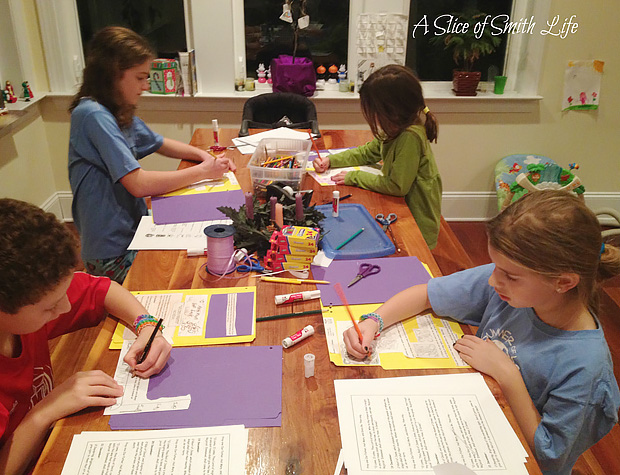Summary
Tracy Bua Smith says that homeschooling provides her children more socialization not less and the opportunity for conversations with all age groups as well.
From the "Top 20 All Time Most Popular Articles."
Editors Note:Originally published May 27, 2014.
I was talking with a friend about homeschooling and she mentioned that her husband wasn’t completely sold on the idea as they raise their toddler together.
“Why is that?” I asked.
As I listened attentively, she explained that her husband worries about the socialization aspect of homeschooling.
I chuckled to myself when I heard her say this, not for the fact that it is such a common concern that I have heard many times in my almost 10 years of homeschooling, but because I just read another one of Matt Walsh’s great blog posts about this very subject a few days before chatting with my friend. In his post, Behold: the two absolutely worst arguments against homeschooling, Walsh answers one of his reader’s emails that accuses homeschool parents of not helping the “system” and the reader believes homeschooling deprives kids of learning proper socialization.
Should Homeschool Parents ‘Help’ the School System
Throughout Walsh’s post he uses quite a bit of humor and sarcasm to make his case. He keeps his reader’s attention with his common sense approach to refuting the naysayer of homeschooling.
For example, to the belief that parents should help the school systems by enrolling their kids into public schools, Walsh first just tells it like it is as he writes, “Dan, listen, I have to be real with you: this isn’t just a bad argument-it’s disturbing. ‘Help the system.’ Is this really a priority for parents? When my wife and I make a decision for our family, should we stop first and ask, “wait, but will this help the system?”
Like Walsh, I also have “no desire to make my children martyrs for some bureaucratic machine.”
As a homeschool parent, I sometimes wonder what is going on within the school system and classrooms, especially when I have very challenging moments teaching my own children day in and day out. Sometimes the system looks like a good option to save my sanity.
But, when times of discouragement and doubt set in I always think back to what a dear friend once told me, “Tracy”, she asserted, “A bad day in homeschooling is better than any good day in traditional school.”
Just when you think Walsh is wrapping it up with his reader’s concern on how families need to help the system, he hits another homerun with this question, “Would the school system be helped if my family ‘participated’ in it? Maybe, and I’m sure the circus would be helped if you went on stage and stuck your head in a lion’s mouth.
But you won’t sacrifice your scalp to the Ringling Brothers, and I won’t sacrifice my kids’ brains to the public school.” Now that is a clever comparison, don’t you think?

The Smith kids making a lapbook during school
The ‘S’ Word (Socialization)
As I continued reading Walsh’s post, I laughed out loud with his answer to his reader’s view that homeschooled kids aren’t properly socialized. In classic Walsh style he states, “I give you this: with the exception of about 14 thousand other times, this is the first time I’ve ever heard this argument.”
From my own experience, it may have been about 14 thousand times that I have been asked about the “s” word when family, friends, acquaintances, and strangers find out I homeschool.
It wasn’t too long ago I was at a local park with my children and I met a mom on the playground. My kids were socializing with her children and running around having a good ole’ time. When the mom found out I homeschooled one of the first questions she had was “What about socialization?”
No matter how much I hear this question, I always welcome it and look at it as an opportunity to break down the typical stereotypes that many have about homeschooling.
I continued the conversation by asking, “Where else in society will our children be placed in a room all day with people their same age? (but not necessarily the same maturity and academic ability levels) I went on to explain that in the real world, we interact with people of all ages. In the workforce we don’t divide employees into 20 year olds over here and 40 year olds over there.
As I homeschool my children, the world is our classroom (as I have read on bumper stickers and wholeheartedly believe) and my children are constantly interacting with people of all ages. For our family, this type of socializing is much more realistic and applicable to the real world.
Of course, I’m not implying that children in traditional school settings don’t know how to interact with others in different age groups; only that homeschooling gives my children much more freedom and practice to carry on conversations with all age groups.
Outsourcing Education?
Walsh makes a great comparison of what socialization looks like in the public school context and how homeschool socialization is different from this context. Walsh points out that “when it comes to teaching a kid any other skill-whether it’s swimming, or driving, or riding a bike, or catching a baseball-all parents understand that their hands-on involvement is crucial.
It’s only with the skill of ‘socializing’ where many of us suddenly decide that the matter should be outsourced to a factory in China (or a factory down the street, in this case).”
Parents are the first teachers of their children. I aspire to have my children learn from my husband and I the social skills that will help them grow into responsible adults, rather than learn these skills from children in their peer groups during school hours.
Deciding to homeschool our children was not an easy decision for our family. My husband and I went through all the typical questions that so many have who are on the fence about bringing their children home to form them academically, but most importantly, spiritually.
As I continue to travel on my homeschool journey, I find much encouragement and comfort when I hear great arguments for homeschooling.
No wonder why I’m such a big fan and follower of Walsh’s blog.

 Seton Magazine Catholic Homeschool Articles, Advice & Resources
Seton Magazine Catholic Homeschool Articles, Advice & Resources

